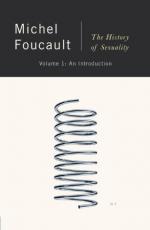
|
| Name: _________________________ | Period: ___________________ |
This quiz consists of 5 multiple choice and 5 short answer questions through Part 4, ,Chapter 1, Objective.
Multiple Choice Questions
1. What element of the confession has opened the pathway to explore existing domains?
(a) Having moral impetus to truthfulness.
(b) Saying what was done.
(c) Saying how the act being confessed was done.
(d) The reconstruction of all individual pleasures.
2. Which of the following is NOT a procedure by which the confession came to be constituted in scientific terms?
(a) Clinical codification.
(b) The need of interpretation.
(c) Medicalization of the effects of confession.
(d) Moral exhortation.
3. Which of the following is NOT a practice of the form of power derived from analysis used to control sexuality in children?
(a) The transference of the act onto the personality of those practicing the sexual expression.
(b) Surveillance of those likely to practice the form of sexual expression.
(c) Discovering the root cause of sexual behavior.
(d) Channeling and controlling sexual expression.
4. Which statement is least correct, according to Foucault, about pedagogical institutions in the eighteenth century?
(a) They have established various points of implantation for sex.
(b) They have multiplied forms of discourse on sexuality of children.
(c) They have imposed ponderous silence on the sex of children.
(d) They have coded contents and qualified speakers regarding sex and children.
5. Which of the many great innovations in the techniques of power in the eighteenth century was inextricably interwoven with the discourse on sex?
(a) The emergence of population as an economic and political problem.
(b) The partnership between church and state.
(c) The concentration of wealth and education.
(d) Serfdom.
Short Answer Questions
1. Which of the following is NOT a statement that Foucault makes?
2. How does Foucault use the French revolution as an example to support his theory of the interconnectedness of juridico-discursive power and law?
3. What best describes the incitement to discourse?
4. What is the feature of juridico-discursive power that Foucault labels as the negative relation of power and sexuality?
5. What is the relationship between pleasure and power?
|
This section contains 471 words (approx. 2 pages at 300 words per page) |

|




